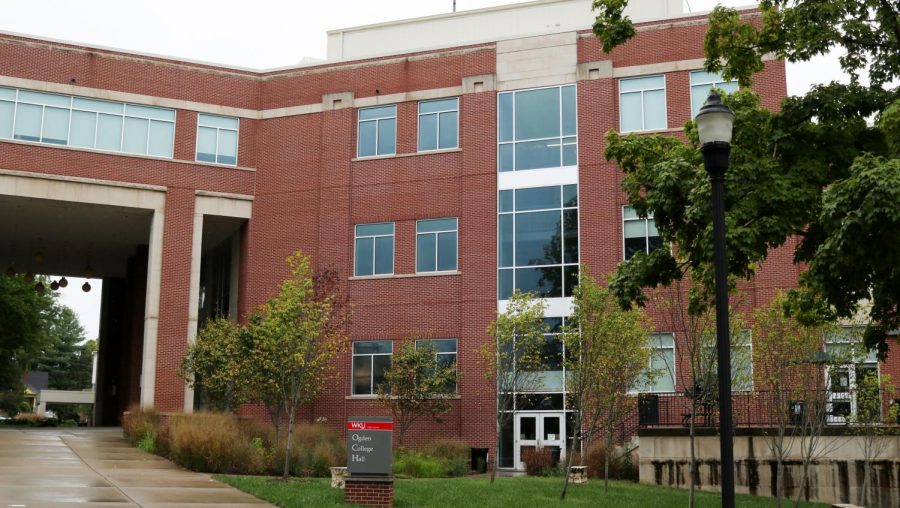Building namesakes with ties to slavery called into question, but the risk of “financial harm” trumped concerns
September 20, 2021
The Naming and Symbols Task Force recommended Northeast Hall be renamed to honor the first black female student to attend WKU. They also recommended the names Ogden, Potter and Van Meter, each with historical ties to slave ownership, be removed from all WKU branding.
President Timothy Caboni announced on Aug. 11 that only Northeast would be renamed.
Abigail Turner, a sophomore psychology major from Campbellsville, said the university’s decisions are contradictory in values.
“If [Caboni] will change Northeast to honor an African American, why will he not change names associated with slavery?” Turner said. “I understand that slavery was a normal thing, but people change. Not that we should get rid of the history, but just because it was the norm doesn’t make it right.”
Caboni said in his announcement that he could not recommend name changes other than Northeast to the Board of Regents for fear of “financial harm” to the university.
The Ogden Hall lease obtained by the Herald stipulates it will maintain its name unless demolished. No mention of this was made in Caboni’s justification.
Northeast was changed to Munday Hall to honor Margaret Munday, who graduated from WKU in 1960 and proceeded to teach all throughout Logan County.
“I am really excited that we’ve honored Ms. Munday. Her contribution to this campus was remarkable,” Caboni said in the announcement. “She was a trailblazer.”
Jace Lux, director of media relations, said Northeast is a central building on campus that will serve as a prominent reminder of Munday’s achievements. He did not elaborate on where “financial harm” might come from with other recommendations.
Jared Conner, a sophomore early childhood development major from Glasgow, was not satisfied with Caboni’s explanation and believed the committee’s recommendations should’ve been fully implemented.
“[All recommended buildings] should be changed,” Conner said. “They are no longer our identities. They are a part of history, but as far as names go, they should reflect our identity, and that isn’t it. We should acknowledge their contributions though, just maybe not in that way.”
Jalynn Brown, a sophomore studying Chinese Language from Erlanger, struggled to understand why Caboni changed Northeast’s name, but not other buildings.
“It sounds like Caboni cares more about finances than the students that are upset at the names,” Brown said.
The Naming and Symbols Task Force was formed in the fall of 2020 to collect community input and provide recommendations for the president based on their research, as stated in its findings report.
The task force was composed of nine faculty members, one Board of Regents member and one WKU student. Members signed non-disclosure agreements which largely prevent members from repeating discussions from within meetings, the Bowling Green Daily News reported in July.
Saundra Ardrey, an associate professor and co-chair of the former Naming and Symbols Task Force, declined to comment about the discrepancy between the group’s recommendations and Caboni’s final decisions.
“We made recommendations based on that research and on community input,” Ardrey said in an email. “The Task Force fully supports the president’s efforts to provide a diverse and inclusive environment for all constituents of the university.”
Ardrey said the work done by the committee was “long and arduous” and the input received from the community was largely unsupportive.
“The media and community were mostly hostile, especially in emails to me, verbal assaults and personal confrontations,” Ardrey said. “The Task Force has made its recommendations to the president. The president has made his decision. There is nothing else I want to add to the narrative.”
Of the nine community comments provided to the Herald, seven were against changing any names on cam- pus and two provided questions for the task force to consider.
One submission from an anonymous alumni called the initiative a “gross misuse of time and resources.” Another said “while you’re at it still… Grow Up!”
The only submission showing support for renaming buildings came from an unnamed professor concentrating in 20th century U.S. history. The submission cited the university’s responsibility to openness and racial equality given that one-third of Warren County’s population were enslaved during the Civil War.
“The long shadow of slavery and slave ownership in Bowling Green leading up to segregation, racial housing covenants, and all the way to current relations with communities of color in Bowling Green must be explicitly discussed and repudiated by the University at every turn,” the professor said. “Certainly a powerful opportunity to do this is to publicly and openly expose the degree to which its history and naming has been intertwined with this brutal history.”
Michael J. Collins contributed reporting.
News reporter Michael Crimmins can be reached at michael.crimmins416@topper.wku.edu. Follow him on Twitter @michael_crimm.













